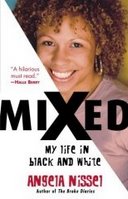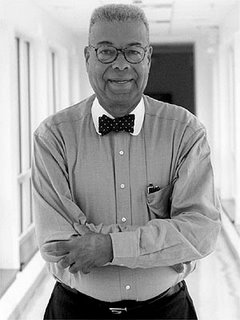Beyond FACTS: FADE by Elliott Lewis and MIXED by Angela Nissel

 Both Fade: My Journeys in Multiracial America by Elliott Lewis (www.lewisfreelance.com) and Mixed: My Life in Black and White by Angela Nissel were published early in 2006; Fade is now out in paperback and Mixed is also available in paperback. Both books explore the interracial experience. While Lewis interviewed Americans of mixed-race heritage and also discussed his own mixed-race background, Nissel wrote of her own biracial identity and the challenges she’s faced because of it.
Both Fade: My Journeys in Multiracial America by Elliott Lewis (www.lewisfreelance.com) and Mixed: My Life in Black and White by Angela Nissel were published early in 2006; Fade is now out in paperback and Mixed is also available in paperback. Both books explore the interracial experience. While Lewis interviewed Americans of mixed-race heritage and also discussed his own mixed-race background, Nissel wrote of her own biracial identity and the challenges she’s faced because of it.While I’ve yet to read either book, they’re on my list. (Next up is the Mixed anthology of short stories edited by Chandra Prasad.) I don’t expect to be shocked by any of the revelations presented by Fade or Nissel’s Mixed, but I believe they’re both important to list on BEYOND Understanding as resources. Critics of Fade point to the limited references to people of mixed-race backgrounds that are not black and white and Lewis has noted the need for more study of the special challenges faced by children and young adults in families that are part Hispanic or Asian. Critics of Nissel’s book point to her poor choice of becoming an exotic dancer (for one night) as a way to exploit the exotic aspect of her mixed-race identity. I understand many women of mixed-race heritage suffer through the exotic stereotype and this is not something to promote as an angle worthy of exploitation, but it’s not like Nissel made a career out of stripping (!), so I’m definitely willing to give her the benefit of the doubt and read her work.
Lewis is a journalist and apparently emphasizes differences in generational perceptions when it comes to mixed-race issues: While older Americans seem to see things in black-and-white terms (Are you black, or are you white?), younger Americans seem more willing and able to accept biracial identity as an accurate indicator. Hopefully a book like Fade helps readers understand that a person is impacted more by their home environment growing up than by their family’s racial mix. Hopefully readers also come away from this book aware once again of the pitfalls of judging anyone based on appearances.
Nissel, a writer whose credits include the (hysterical!) Scrubs sitcom, apparently infused her book with a great deal of humor, so it should prove to be a fun as well as enlightening read. Some reviewers call it fall-down funny despite the serious challenges Nissel explored in it.
If anyone’s read either work and wants to add their two cents here, feel free. I’ll be sure to follow up with reviews at a later date, but for now at least I’ll get these two works added to the BEYOND Understanding resource list. Have I mentioned how I wish there were more hours in every day? So much to do, so many books to read, so much to learn, to write (to cook and clean!). We’ll get there.











